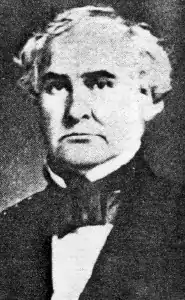Hiram V. Willson
Hiram V. Willson (April 1808 – November 11, 1866) was a United States district judge of the United States District Court for the Northern District of Ohio.
Hiram V. Willson | |
|---|---|
 | |
| Judge of the United States District Court for the Northern District of Ohio | |
| In office February 20, 1855 – November 11, 1866 | |
| Appointed by | Franklin Pierce |
| Preceded by | Seat established by 10 Stat. 604 |
| Succeeded by | Charles Taylor Sherman |
| Personal details | |
| Born | Hiram V. Willson April 1808 Madison County, New York |
| Died | November 11, 1866 (aged 58) Cleveland, Ohio |
| Political party | Democratic |
| Education | Hamilton College read law |
| Signature | |
Education and career
Born in April 1808, in Madison County, New York,[1][2] Willson graduated from Hamilton College in 1832 and read law,[2] first in the office of Jared Willson of Canandaigua, New York, then in the office of Francis Scott Key in Washington, D.C.[1] After moving to Painesville, Ohio in 1833,[1] he was admitted to the bar and entered private practice with Henry B. Payne[1] in Cleveland, Ohio from 1834 to 1855.[2] In 1852, Willson was nominated by the Democratic Party for United States House of Representatives, but lost to his law partner Edward Wade of the Free Soil Party.[1] In 1854, the Cleveland Bar Association sent Willson to lobby Congress to divide the state of Ohio into two Federal Judicial Districts.[1] The effort was successful.[1]
Federal judicial service
Willson was nominated by President Franklin Pierce on February 10, 1855, to the United States District Court for the Northern District of Ohio, to a new seat authorized by 10 Stat. 604.[2] He was confirmed by the United States Senate on February 20, 1855, and received his commission the same day.[2] His service terminated on November 11, 1866,[2] due to his death of consumption (tuberculosis)[1] in Cleveland.[2] Some months before his death, he was received into the First Presbyterian Church.[1]
Notable case
Willson's most notable case was the trial of the Oberlin–Wellington Rescue conspirators in 1858.[1]
References
- Cleave, Egbert (1875). City of Cleveland and Cuyahoga County: taken from Cleave's Biographical Cyclopaedie of the state of Ohio. Cleveland: Fairbanks, Benedict & Co. pp. 33–35.
- Hiram V. Willson at the Biographical Directory of Federal Judges, a public domain publication of the Federal Judicial Center.
Sources
- Hiram V. Willson at the Biographical Directory of Federal Judges, a public domain publication of the Federal Judicial Center.